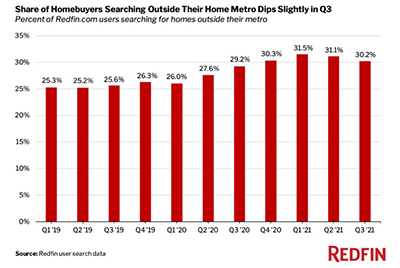
Share of Migration Slows; ‘High-Crime’ Neighborhoods Take a Hit

Nationwide, 30.2% of Redfin.com users looked to move to a different metropolitan area in the third quarter, down from 31.1% in the second quarter, marking the second-straight quarter of declines following four-consecutive quarters of increases.
Although the percentage of users moving to a new metro area in the third quarter declined, interest in relocation during the third quarter remained higher than it was a year earlier (29.2%) and before the pandemic (26%).
Redfin Deputy Chief Economist Taylor Marr said the slowdown in relocations coincided with a cooling of the overall housing market: He said homebuyer bidding wars, home-price growth and home-sales growth have all been falling, adding that the housing market typically slows at this time of year.
“We expect Americans to continue relocating at a higher rate than they did before the coronavirus pandemic,” Marr said. “As employers fight to retain talent during the ongoing labor shortage, they’ll face mounting pressure to introduce permanent flexible-work policies that will give more workers the option to move where they want. We’re also starting to see a resurgence in demand for vacation homes, which could help sustain the relatively high rate of house hunters searching outside their home metro.”
Miami, Phoenix, Sacramento, Las Vegas and Tampa were the most popular migration destinations of any major U.S. metros in the third quarter, meaning they had the largest net inflows. Metros that are warmer and more affordable than major job centers like New York and San Francisco often top the list of most popular migration destinations. They’ve become even more sought after during the pandemic because remote workers have been able to prioritize housing costs, space and weather over commute times.
In a separate report, Redfin said crime and safety were the most commonly cited factors for homeowners deciding where to move, whereas for renters it was cost of living.
“There are plenty of positive reasons to make a move, but sometimes people move to flee a place where they felt unsafe,” said Redfin Chief Economist Daryl Fairweather. “Concerns with crime, especially among homeowners, contributed to a recent increase in migration out of cities and into more suburban and rural areas. Cities historically have been able to attract residents looking for high paying jobs, but now that remote work is ubiquitous, some may have to work on improving safety and other quality of life factors to retain and attract residents. This might be an uphill battle, because as wealthy residents leave, they take tax dollars with them, leaving cities with less resources to address safety concerns for remaining residents.”
Redfin said people who moved to a new metro area were more likely than those who stayed local to say that taxes and climate change were issues that factored into their decision of where to move. Nearly a third (32%) of metro-movers said that taxes were a major factor in their choice of where to move, compared to nearly a quarter (24%) of those who stayed in the same metro. Climate change was a major factor for 24% of metro-movers and 19% of those who moved within a metro. With many workers now finding themselves newly mobile thanks to recent expansions of remote work, this could portend a wave of migration inspired by taxes and climate change.
The report can be accessed at https://www.redfin.com/news/survey-half-of-homeowners-who-moved-cited-crime/.
